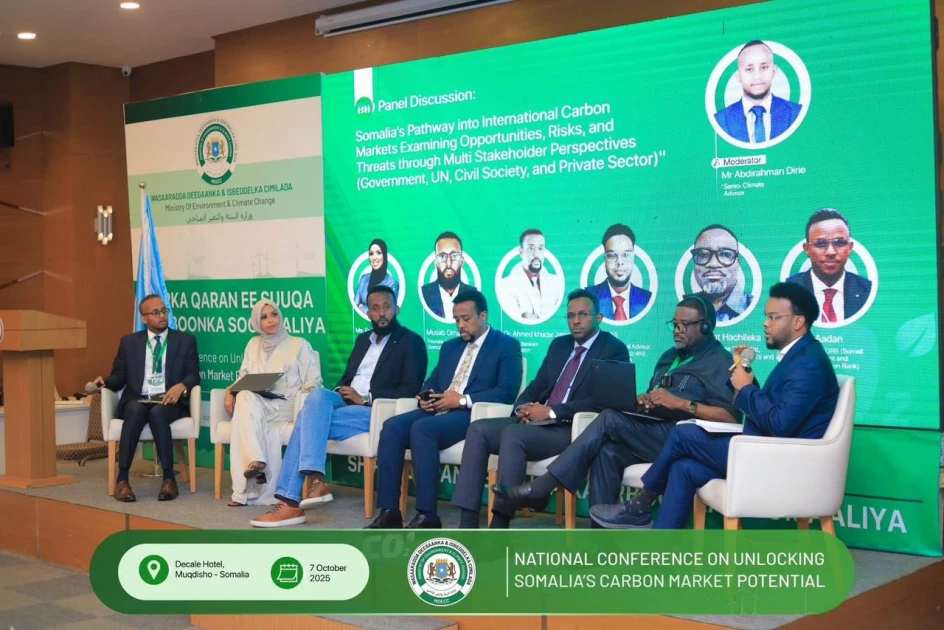OPINION: Somalia’s carbon market awakening - A new chapter in climate leadership


Audio By Vocalize
Somalia has signalled a bold shift in its climate ambition with the First National Carbon Markets Conference, held in Mogadishu on 7 October 2025.
Speaking at the opening, Lt. Bashir Mohamed Jama, Minister of Environment & Climate Change (MoECC),
reaffirmed the government’s commitment, noting that “carbon markets must serve resilience, sustainable
development, and justice for our people.”
The landmark event
showcased the nation’s determination to build the systems and partnerships
needed to unlock high-integrity climate finance and drive a just green
transition. From the outset, the message was clear: Somalia is stepping into
global carbon markets on its own terms, with strong governance, community
inclusion, and national pride.
Mogadishu,
Somalia — A Personal Reflection on a Defining Moment
Standing in Mogadishu on 7 October 2025, surrounded by ministers, technical experts, development partners, and young Somali innovators, I could feel a renewed sense of national ownership and pride.
The National Conference on Unlocking Somalia’s Carbon Market Potential
was more than a policy event; it was a declaration that Somalia is ready to
lead its own climate future. The discussions, energy, and collaboration
reflected a country no longer waiting to be helped, but one shaping its own
destiny, with clarity, confidence, and commitment. Somalia is proving that
climate ambition and national pride can go hand in hand.
A Testament to
National Leadership
Under the
leadership of the MoECC, Somalia is advancing institutional foundations for
climate finance and policy reform. The Ministry’s coordination and foresight
were widely commended, highlighting a transition from donor-driven
interventions to Somali-owned solutions.
Through this leadership,
Somalia is emerging as a pioneer in Africa’s carbon market, translating
national ambition into policy, partnerships, and people-centred outcomes. As
one participant noted, “We can feel Somalia taking charge of its
environmental destiny.”
From
Aid Dependence to Climate Opportunity
For decades, Somalia’s
development story has been tied to humanitarian aid. But today, a new narrative
is emerging, one that moves from aid to agency.
Anchored in National Transformation Plan I (NTP I, 2025–2029), Somalia is advancing ecosystem restoration,
renewable energy, sustainable land use, and blue carbon development as drivers
of green growth and resilience. In this context, carbon markets are a powerful
tool to support jobs, livelihoods, and local
economies.
Turning
Ambition into Action
Somalia’s updated Nationally Determined Contribution (NDC 3.0), submitted in June 2025, pledges to reduce
emissions by 34% below Business-as-Usual by 2035 — a clear
signal of leadership.
Achieving this ambition
requires USD 11.5 billion over the
decade, with only USD 274 million available
domestically. Carbon markets offer a pathway to mobilise results-based finance
aligned with Somalia’s priorities, including clean cooking, sustainable
rangelands, and blue economy opportunities.
“A well-governed carbon
market is not only about reducing emissions, it’s about empowering communities
with jobs, resilience, and sustainable growth,”- Lionel Laurens, UNDP
Resident Representative in Somalia.
Institutional
Readiness and Forward Thinking
Somalia has taken
significant first steps in establishing the Designated National Authority (DNA) under
Article 6 of the Paris Agreement as the official focal point for carbon
governance.
In collaboration with
line ministries and institutions such as the Somalia Development and Reconstruction Bank (SDRB), the government has completed a national readiness assessment, identifying priority actions to unlock access
to carbon finance. The next phase includes developing a National Carbon Market Strategy, a carbon registry, and digital Monitoring, Reporting and Verification (MRV) systems.
“The First National
Carbon Markets Conference marks a historic milestone for Somalia,” said Ayan Harare, Climate Finance Unit Coordinator and Article 6 DNA
Representative.
“Carbon markets may be complex, but with the right systems we can guarantee transparency, trust, and integrity, ensuring each carbon credit delivers real benefits for communities and advances our national climate goals.”
Africa’s
Shared Opportunity
Africa has enormous
potential for high-integrity carbon credits. The Africa Carbon Markets Initiative (ACMI) estimates the continent could generate USD 6 billion annually and
create 30 million jobs by 2030, yet it
currently generates only around 2% of its
potential.
“Sound, predictable and
enforced regulation is the cornerstone of a credible carbon market,” said H.E.Steen Sonne Andersen, Ambassador of Denmark to Somalia.
“Fair and transparent revenue-sharing between investors, communities, and
government, both federal and state, is essential. Somalia has a unique
opportunity to learn from global experiences and get it right from the start.”
Regional
Integration and East African Leadership
Somalia’s recent accession to the East African Community (EAC) adds new
momentum to regional green integration.
The country’s vast
coastline, blue-carbon ecosystems, and renewable energy potential can
strengthen East Africa’s climate finance
architecture through harmonised standards, cross-border project
development, and shared carbon market infrastructure.
A
Spirit of Ownership and Optimism
What stood out
throughout the forum was the sense of Somali leadership and
ownership. The agenda was
driven by Somali officials, youth, private sector voices, and experts, a clear
sign that Somalia’s carbon vision is being authored at home.
As one youth delegate
noted, “This isn’t just about carbon
credits — it’s about creating a greener, fairer Somalia.”
A
Path Forward
Somalia’s carbon
market journey has only begun, but the foundation is strong. With sustained
leadership from the Ministry of Environment and Climate Change (MoECC) and
inclusive collaboration across all stakeholders, Somalia is building a carbon
market that reflects integrity, equity, and national ambition.
“Carbon credits
have the potential to be an essential component of child-responsive climate
finance and can contribute to adaptation and mitigation efforts that directly
benefit children,” said Georges Tabbal, Chief of Water,
Sanitation and Hygiene, UNICEF Somalia.
Somalia’s story
is no longer one of fragility, it is becoming a story of resilience, reform, and
renewed confidence.
Farhiya M. Farah –
Independent Consultant specializing in Climate Action; CEO of Earth Story
Africa; Advisor to the Somali Climate Action Platform (SCAP).
Ayan Harare –
Climate Finance Unit Coordinator, Ministry of Environment & Climate Change
(MoECC), and Article 6 Focal Point for Somalia.
Contact: Ayan.harare@moecc.gov.so
|ffarah@earthstoryafrica.org


Leave a Comment